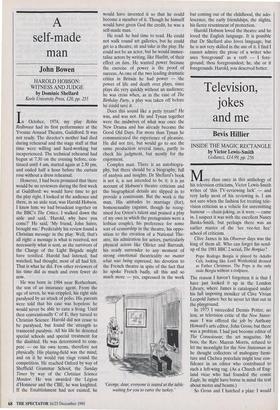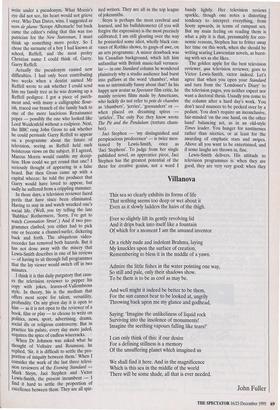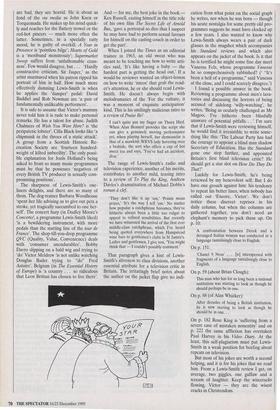Television, jokes and me
Bevis Hillier
INSIDE THE MAGIC RECTANGLE by Victor Lewis-Smith Gollancz, £14.99, pp. 256 More than once in this anthology of his television criticisms, Victor Lewis-Smith writes of 'this TV-reviewing lark' — and very larky most of his reviewing is. I am not sure when the fashion for treating tele- vision criticism as a vehicle for unremitting humour — chain-joking, as it were — came in. I suspect it was with the excellent Nancy Banks-Smith, but perhaps there was an earlier master of the 'tee vee-tee hee' school of criticism.
Clive James in his Observer days was the king of them all. Who can forget his send- up of the 1981 BBC 2 serial, The Borgias?
Pope Rodrigo Borgia is played by Adolfo Celi, looking like Lord Weidenfeld dressed as Father Christmas. The Pope is the only male Borgia without a codpiece.
The reason I haven't forgotten it is that I have just looked it up in the London Library, where James is catalogued under his full imposing moniker of Clive Vivian Leopold James: bet he never let that out in the playground.
In 1973 I succeeded Dennis Potter, no less, as television critic of the New States- man. I was offered the job by Anthony Howard's arts editor, John Gross; but there was a problem. I had just become editor of The Connoisseur, the art magazine. My boss, the Rev. Marcus Morris, refused to let me moonlight for the New Statesman as he thought collectors of mahogany furni- ture and Chelsea porcelain might lose con- fidence in an editor who contributed to such a left-wing rag. (As a Church of Eng- land vicar who had founded the comic Eagle, he might have borne in mind the text about motes and beams.) So Gross and I hatched a plan: I would write under a pseudonym. What Morris's eye did not see, his heart would not grieve over. Who Dan Dares, wins. I suggested as nom de plume `Scrope Albemarle' but back came the editor's ruling that this was too patrician for the New Statesman, I must think up something more proley. So I chose the surname of a boy I had known at school, Reffell, and the most proley Christian name I could think of, Garry. Garry Reffell. Actually the pseudonym caused new difficulties. I had only been contributing two weeks when a dentist named Mr Reffell wrote to ask whether I could send him my family tree as he was drawing up a Reffell pedigree. I got a piece of parch- ment and, with many a calligraphic flour- ish, traced our branch of the family back to one of the more lascivious Renaissance popes — possibly the one who looked like Lord Weidenfeld without a codpiece. Next, the BBC rang John Gross to ask whether he could persuade Garry Reffell to appear on a programme about the future of television, seeing as Reffell held such boisterous views on the subject. If I agreed, Marcus Morris would rumble my decep- tion. How could we get round that one? I seriously thought of appearing in a false beard. But then Gross came up with a capital wheeze: he told the producer that Garry would have loved to appear, but sadly he suffered from a crippling stammer. In those days, a television reviewer faced perils that have since been eliminated. Having to stay in and watch wrecked one's social life. (Well, you try telling the late `Bubbles' Rothermere, 'Sorry, I've got to watch Coronation Street'.) And if two pro- grammes clashed, you either had to pick one or become a channel-surfer, dickering back and forth. The ubiquitous video- recorder has removed both hazards. But it has not done away with the misery that Lewis-Smith describes in one of his reviews — of having to sit through full programmes that the lay viewer would switch off in two minutes.
I think it is this daily purgatory that caus- es the television reviewer to pepper his copy with jokes, leaves-of-Vallombrosa style. In theory, his is the medium that offers most scope for talent, versatility, profundity. On any given day it is open to him — as it is not open to the reviewer of a book, film or play — to choose to write on politics, news, sport, advertising, drama, social ills or religious controversy. But in practice his palate, every day more jaded, requires the spice of endless wisecracks. When Dr Johnson was asked what he thought of Voltaire and Rousseau, he replied, 'Sir, it is difficult to settle the pro- portion of iniquity between them.' When I consider the work of the last three televi- sion reviewers of the Evening Standard Mark Steyn, Jaci Stephen and Victor Lewis-Smith, the present incumbent — I find it hard to settle the proportion of excellence between them. They are all spir- ited writers. They are all in the top league of jokesmiths.
Steyn is perhaps the most cerebral and learned, and his bullshitometer (if you will forgive the expression) is the most precisely calibrated; I am still gloating over the way he poniarded some idiot, wholly black can- vases of Rothko shown, to gasps of awe, on an arts programme. A minor drawback was his Canadian background, which left him unfamiliar with British music-hall vernacu- lar — in one Standard column he wondered plaintively why a studio audience had burst into guffaws at the word 'chamber', what was so intrinsically funny about that? In his happy new avatar as Spectator film critic, he mainly reviews films made by Americans, who luckily do not refer to pots de chambre as 'chambers', `ferries', `goesunders' or when placed on dreaming spires 'articles'. The only Poe they know wrote The Pit and the Pendulum (torture cham- ber).
Jaci Stephen — 'my distinguished and perspicacious predecessor' — is twice men- tioned by Lewis-Smith, once as `Jaci Stephens'. To judge from her single published novel, an apprentice piece, Jaci Stephen has the greatest potential of the three for creative genius, not a word I bandy lightly. Her television reviews sparkle, though one notes a distorting tendency to interpret everything, from Sooty upwards, in terms of rampant sex. But my main feeling on reading them is what a pity it is that, presumably for eco- nomic reasons, Stephen has to fritter away her time on this work, when she should be writing searing Lawrentian novels, as burst- ing with sex as she likes.
The golden apple for the best television reviewer, qua television reviewer, goes to Victor Lewis-Smith, victor indeed. Let's agree that when you open your Standard and turn from the 'Londoner's Diary' to the television pages, you neither expect nor want a doctoral thesis. Usually you come to the column after a hard day's work. You don't need nuances to be pecked over by a pedant. You don't require an inconclusive, fair-minded 'on the one hand, on the other hand' balancing act, as in an old-style Times leader. You hunger for nastinesses rather than niceties, or at least for the awarding of emphatic stars and swipes. Above all you want to be entertained, and if some laughs are thrown in, fine.
Lewis-Smith delivers. His attitude to television programmes is: when they are good, they are very very good; when they are bad, they are horrid. He is about as fond of the via media as John Knox or Torquemada. He makes up his mind quick- ly and reaches for the flattery trowel or the red-hot pincers — much more often the latter. Sometimes, in a specially ratty mood, he is guilty of overkill. A Year in Provence is 'pointless bilge'; Hearts of Gold is a 'moribund monstrosity'; Supermarket Sweep suffers from 'unfathomable crass- ness'. Few would disagree, but . . . 'Hardly constructive criticism, Sir Jasper,' as the artist murmured when his patron ripped his portrait of him in half. How much more effectively damning Lewis-Smith is when he applies the 'damper' pedal: David Baddiel and Rob Newman are 'a pair of fundamentally unlikeable performers'.
It is safe to assume that Victor's mummy never told him it is rude to make personal remarks. He has a talent for abuse. Judith Chalmers of Wish You Were Here? is 'the peripatetic lobster'. Cilia Black looks like 'a chipmunk in the throes of a static attack'. A group from a Scottish Historic Re- creation Society are 'fourteen hundred- weight of kilted imbecility'. The only possi- ble explanation for Jools Holland's being asked to front so many music programmes must be that he possesses 'negatives of every British TV producer in sexually com- promising positions'.
The sharpness of Lewis-Smith's one- liners delights, and there are so many of them. The dog-trainer Barbara Woodhouse `spent her life advising us to give our pets a stroke, yet tragically succumbed to one her- self. The concert harp (in Dudley Moore's Concerto!, a programme Lewis-Smith liked) `is a bewildering instrument, with more pedals than the starting line of the tour de France'. The shop-till-you-drop programme QVC (Quality, Value, Convenience) deals with 'consumer unendurables'. Bobby Davro slipping on a bald wig and trying to `do' Victor Meldrew 'is not unlike watching Douglas Bader trying to "do" Fred Astaire'. Belgium (in The Essential History of Europe) is 'a country . . . so ridiculous that Leon Brittan has chosen to live there'. And — for me, the best joke in the book Ken Russell, casting himself in the title role of his own film The Secret Life of Arnold Bax, 'gave a portrayal so dire that I suspect he may have had to perform sexual favours for himself on the casting couch in order to get the part'.
When I joined the Times as an editorial trainee in 1963, an old sweat who was meant to be teaching me how to write arti- cles said, 'It's like having a baby — the hardest part is getting the head out.' If a would-be reviewer wanted an object-lesson on how to write 'intros' that grab the read- er's attention, he or she should read Lewis- Smith. He doesn't always begin with melodramatics of the 'For the vulture, it was a moment of exquisite anticipation' kind. This is his smilingly malicious intro to a review of Praise Be!
I can't quite put my finger on Thora Hird. When Alan Bennett provides the script she can give a genuinely moving performance yet, when playing herself, her demeanciur is that of a mawkish WRVS lady hovering over a bedside, the sort who offers a cup of hot sweet tea and says, 'You've had an accident, dear.'
The range of Lewis-Smith's radio and television experience, another of his merits, contributes to another mild, teasing intro to a review of To Play the King, Andrew Davies's dramatisation of Michael Dobbs's roman a clef.
They don't like it up 'em,' Points mean prizes,' It's the way I tell 'em.' No matter how popular a catchphrase becomes, they've hitherto always been a little too vulgar to appeal to refined sensibilities. But recently we have witnessed the arrival of the first ever middle-class catchphrase, which I've heard being quoted everywhere from Hampstead wine bars to gentlemen's clubs in St James's. Ladies and gentlemen, I give you, 'You might think that — I couldn't possibly comment.'
That paragraph gives a hint of Lewis- Smith's aliveness to class divisions, another essential attribute for a television critic in Britain. The irritatingly brief notes about the author on the jacket flap give no indi- cation from what point on the social graph he writes, nor when he was born — though his acute nostalgia for some pretty old pro- grammes suggests he must have clocked up a few years. I also wanted to know why Lewis-Smith always wears a pair of dark glasses in the mugshot which accompanies his Standard reviews and which also appears on the jacket of the book. Is it that he is terrified he might some fine day meet Vanessa Felz, whose programme Vanessa he so comprehensively rubbished? (` "It's been a hell of a programme," said Vanessa at the close, and I could scarcely disagree.') I found a possible answer in the book. Reviewing a programme about men's lava- tories and discussing the horrors of being accused of sidelong 'willy-watching', he writes, 'Being as ocularly challenged as Mr Magoo, I've hitherto been blissfully unaware of potential pitfalls. . . ' I'm sure that if Lewis-Smith were reviewing himself, he would find it irresistible to write some- thing like this: 'The Labour Party has had the courage to appoint a blind man shadow Secretary of Education. Has the Standard gone one step further, and appointed Britain's first blind television critic? He should get a star slot on How Do They Do That?'
Luckily for Lewis-Smith, he's being reviewed by my benevolent self. But I do have one grouch against him: his tendency to repeat his better lines, when nobody has called out 'Encore, Victor'. We don't notice these discreet reprises in his daily column, but when the columns are gathered together, you don't need an elephant's memory to pick them up. On p. 10:
A confrontation between Derek and a deranged Italian woman was conducted in a language tantalisingly close to English.
On p. 151:
'Chanel 9 Neus' . . . [is] interspersed with fragments of a language tantalisingly close to English.
On p. 59 (about Brian Clough):
This man who has for so long been a national institution was starting to look as though he should perhaps be in one.
On p. 88 (of Alan Whicker):
After decades of being a British institution, he is now starting to look as though he should be in one.. .
On p. 182 Rose King is 'suffering from a severe case of mistaken nonentity' and on p. 222 the same affliction has overtaken Paul Harvey in his Video Diary. At the least, this self-plagiarism must put Lewis- Smith in a weak position for beefing about repeats on television.
But most of his jokes are worth a second helping, and it is for his jokes that we read him. From a Lewis-Smith review I get, on average, two giggles, one guffaw and a scream of laughter. Keep the wisecracks flowing, Victor — they are the wisest cracks in Christendom.












































































































 Previous page
Previous page